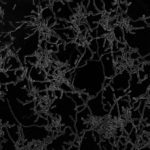Link to Pubmed [PMID] – 33836061
Link to DOI – jkab11010.1093/g3journal/jkab110
G3 (Bethesda) 2021 Apr; ():
The opportunistic fungal pathogen Candida albicans undergoes an unusual parasexual cycle wherein diploid cells mate to form tetraploid cells that can generate genetically diverse progeny via a non-meiotic program of chromosome loss. The genetic diversity afforded by parasex impacts clinically relevant features including drug resistance and virulence, and yet the factors influencing genome instability in C. albicans are not well defined. To understand how environmental cues impact genome instability, we monitored ploidy change following tetraploid cell growth in a panel of different carbon sources. We found that growth in one carbon source, D-tagatose, led to high levels of genomic instability and chromosome loss in tetraploid cells. This sugar is a stereoisomer of L-sorbose which was previously shown to promote karyotypic changes in C. albicans. However, while expression of the SOU1 gene enabled utilization of L-sorbose, overexpression of this gene did not promote growth in D-tagatose, indicating differences in assimilation of the two sugars. In addition, genome sequencing of multiple progeny recovered from D-tagatose cultures revealed increased relative copy numbers of chromosome 4, suggestive of chromosome-level regulation of D-tagatose metabolism. Together, these studies identify a novel environmental cue that induces genome instability in C. albicans, and further implicate chromosomal changes in supporting metabolic adaptation in this species.


